Lingua Latina Familia Romana Collection (11 vols.)
Digital Logos Edition
Overview
Hans Orberg’s Lingua Latina: Per Se Illustrata is the world’s premier series for learning Latin through the natural method. In Lingua Latina, students first learn grammar and vocabulary intuitively through extended contextual reading and an innovative system of marginal notes. It is the only series currently available that gives students the opportunity to learn Latin without resorting to translation, but allows them to think in the language. It is the most popular text for teachers—at both the secondary and collegiate levels—who wish to incorporate conversational skills into their classroom practice.
The Lingua Latina Familia Romana Collection features the first part/year of Hans H. Orberg’s standard setting Lingua Latina series: Familia Romana. In addition to the primary textbook, this collection includes six supplementary volumes full of exercises, vocabularies, and supplemental readings. Also featured are four volumes of exemplary Latin prose sampling the likes of Cicero, Tacitus, and Martial, as well as Latin translation of Old Testament passages.
Now you can streamline your Latin language education with the digital editions of these texts. All Scripture citations link directly to English translations, and important terms link to dictionaries, encyclopedias, and a wealth of other resources in your digital library. Perform powerful searches to find exactly what you’re looking for. Augment your vocabulary with Logos’ expansive library of Latin texts and side-by-side translations from Harvard’s Loeb Classical Library. Take the classroom with you using tablet and mobile apps. With Logos, the most efficient and comprehensive research tools are in one place, so you get the most out of your study.
The Lingua Latina Familia Romana Collection (11 vols.) is only available for users in the U. S., Canada, Great Britain, Australia, New Zealand, and South Africa.

- The premier series for learning Latin with the natural method
- Annotated samplings from classic Latin texts
- Seamless integration of classic Latin texts
None of Lingua Latina’s competitors achieve the seamless transition from the author’s Latin to ancient Latin authors that is the hallmark of the Orberg series. When students read unadapted passages from ancient authors in Lingua Latina, they often have the impression that the ancient author’s work is even easier than the Orberg Latin they are already reading without difficulty. This is because they have been well prepared by the meticulous and almost invisible gradations in Orberg’s work.
—C. G. Brown, University of Kentucky
- Title: Lingua Latina Familia Romana Collection
- Series: Lingua Latina: Per Se Illustrata
- Publisher: Focus Publishing
- Volumes: 11
- Pages: 1,217
- Familia Romana by Hans H. Orberg
- Latin-English Vocabulary I by Hans H. Orberg
- Exercitia Latina I by Hans H. Orberg
- Colloquia Personarum by Hans H. Orberg
- Fabulae Syrae by Luigi Miraglia
- Grammatica Latina by Hans H. Orberg
- Latine Disco: Student’s Manual by Hans H. Orberg
- Amphitryo Comoedia by Hans H. Orberg
- Caesaris Commentarii de Bello Gallico by Hans H. Orberg
- Sermones Romani by Hans H. Orberg
- Epitome Historiae Sacrae by Charles Francois Lhomond
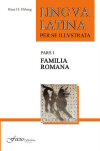
Familia Romana is the backbone of the Orberg series, Lingua Latina: Per Se Illustrata. It is the primary textbook for the part one/year one of the series. The text can be paired with any number of additional readers and study materials designed specifically to accompany this text.
Hans H. Orberg (1920–2010) taught Latin in Denmark for ten years through The Nature Method Institute before becoming a teacher at Grenaa Gymnasium. He first published the Lingua Latina series in 1955. Upon his retirement he ran the publishing house, Domus Latina.
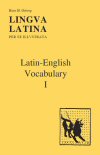
Latin-English Vocabulary I
- Author: Hans H. Orberg
- Series: Lingua Latina: Per Se Illustrata
- Publisher: Focus Publishing
- Publication Date: 1998
- Pages: 20
This volume is an English to Latin vocabulary of words used in Familia Romana, designed for native English speakers learning Latin.
Hans H. Orberg (1920–2010) taught Latin in Denmark for ten years through The Nature Method Institute before becoming a teacher at Grenaa Gymnasium. He first published the Lingua Latina series in 1955. Upon his retirement he ran the publishing house, Domus Latina.
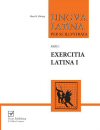
This workbook contains supplemental grammatical exercises for each of the 133 lessons in Familia Romana.
Hans H. Orberg (1920–2010) taught Latin in Denmark for ten years through The Nature Method Institute before becoming a teacher at Grenaa Gymnasium. He first published the Lingua Latina series in 1955. Upon his retirement he ran the publishing house, Domus Latina.
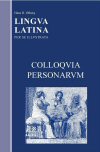
This volume contains an illustrated collection of supplementary texts for Familia Romana. It features one colloquium for each of the first 24 chapters in Familia Romana.
Hans H. Orberg (1920–2010) taught Latin in Denmark for ten years through The Nature Method Institute before becoming a teacher at Grenaa Gymnasium. He first published the Lingua Latina series in 1955. Upon his retirement he ran the publishing house, Domus Latina.
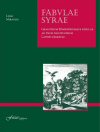
Fabulae Syrae
- Author: Luigi Miraglia
- Series: Lingua Latina: Per Se Illustrata
- Publisher: Focus Publishing
- Publication Date: 2011
- Pages: 104
A basic knowledge of classical mythology is indispensable in understanding and appreciating ancient culture, art history and even modern literature. This assortment of 50 captivating myths of Rome and Athens provides extended readings selected or adapted from the works of ancient authors which not only introduce readers to the essential legends of Roman literature, but also cement the grammar and vocabulary taught in an introductory course of Latin. The collection begins with the adventure of Pygmalion, the Cypriot sculptor who carved a woman out of ivory, and ends with nearly 200 verses of original Latin from books two and three of Ovid’s Metamorphoses.
This volume contains an illustrated collection of supplementary texts for Familia Romana. It features one colloquium for each of chapters 26 to 34 in Familia Romana.
Luigi Miraglia is the founder and president of the Academy Vivarium Novum in Rome. He is a classical philologist and a world famous pedagogue. He is currently a professor on the Latin faculty at the Pontifical Salesian University.
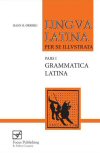
Grammatica Latina
- Author: Hans H. Orberg
- Series: Lingua Latina: Per Se Illustrata
- Publisher: Focus Publishing
- Publication Date: 2005
- Pages: 32
This Latin morphology contains tables of paradigms and forms corresponding to the material in Familia Romana.
Hans H. Orberg (1920–2010) taught Latin in Denmark for ten years through The Nature Method Institute before becoming a teacher at Grenaa Gymnasium. He first published the Lingua Latina series in 1955. Upon his retirement he ran the publishing house, Domus Latina.
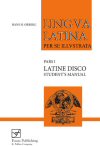
Latine Disco: Student’s Manual
- Author: Hans H. Orberg
- Series: Lingua Latina: Per Se Illustrata
- Publisher: Focus Publishing
- Publication Date: 2005
- Pages: 50
This volume contains a student’s manual with a guide to pronunciation and instructions on key points in each chapter of Familia Romana.
Hans H. Orberg (1920–2010) taught Latin in Denmark for ten years through The Nature Method Institute before becoming a teacher at Grenaa Gymnasium. He first published the Lingua Latina series in 1955. Upon his retirement he ran the publishing house, Domus Latina.
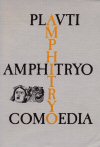
Amphitryo Comoedia
- Author: Hans H. Orberg
- Series: Lingua Latina: Per Se Illustrata
- Publisher: Focus Publishing
- Publication Date: 1992
- Pages: 84
This volume contains an abridged edition of Plautus’ Amphitryo Comoedia with an introduction and marginal notes from Hans H. Orberg. It is designed for those who have worked through Familia Romana.
Hans H. Orberg (1920–2010) taught Latin in Denmark for ten years through The Nature Method Institute before becoming a teacher at Grenaa Gymnasium. He first published the Lingua Latina series in 1955. Upon his retirement he ran the publishing house, Domus Latina.
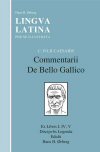
Caesar: De Bello Gallico
- Author: Hans H. Orberg
- Series: Lingua Latina: Per Se Illustrata
- Publisher: Focus Publishing
- Publication Date: 2009
- Pages: 96
This volume contains an abridged edition of De Bello Gallico with and index of vocabulary and marginal notes from Hans H. Orberg.
Hans H. Orberg (1920–2010) taught Latin in Denmark for ten years through The Nature Method Institute before becoming a teacher at Grenaa Gymnasium. He first published the Lingua Latina series in 1955. Upon his retirement he ran the publishing house, Domus Latina.
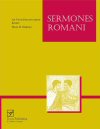
Sermones Romani
- Author: Hans H. Orberg
- Series: Lingua Latina: Per Se Illustrata
- Publisher: Focus Publishing
- Publication Date: 2004
- Pages: 80
Presented via the natural method by Hans Orberg, Sermones Romani allows introductory students to read lightly altered Latin texts. Through his innovative system of marginal notes, Hans Orberg introduces the reader to the language and thought of ancient Rome through short readings by Cicero, Tacitus, Martial and others. Sermones Romani can be read immediately following Orberg’s first year elementary text, Familia Romana.
Hans H. Orberg (1920–2010) taught Latin in Denmark for ten years through The Nature Method Institute before becoming a teacher at Grenaa Gymnasium. He first published the Lingua Latina series in 1955. Upon his retirement he ran the publishing house, Domus Latina.
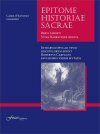
Epitome Historiae Sacrae
- Author: Charles Francois Lhomond
- Series: Lingua Latina: Per Se Illustrata
- Publisher: Focus Publishing
- Publication Date: 2011
- Pages: 203
This volume contains 209 Latin readings from Old Testament books. It also features engaging exercises, including crosswords and matching. Epitome Historiae Sacrae drills and reviews grammar while adding more than 1,300 words to students’ vocabulary and modeling excellent Latin prose style. It is ideal for students who have completed Familia Romana.
Charles Francois Lhomond (1727–1794) was a French priest, grammarian, and educator. He is remembered for his contributions to education and is the author of several works on grammar and Roman and religious history.
Reviews
3 ratings

James Lanier
3/19/2023

Mark Vincent Franks
4/26/2017
The problem with these are they are scans not typeset. Less than optimal... Focus publishing offers these same scans - which I am sure is what they provided Logos. I have nearly all these books and they are excellent for learning Latin. I also have the kindle version of Lingua Latina - Familia Roman volume. Personally, I rather have the text typeset for two reasons: readability and for clicking on the individual words to look up meaning or copying snippets. As far as readability goes - I don't like the out-of-focus feel to reading these as it strains the eyes. Having higher resolutions screens their scans should match iPad or Surface resolutions - 3000x2000 (267 PPI). As a comparison, look at the scans that the British Library has done: http://www.bl.uk/manuscripts/Viewer.aspx?ref=cotton_ms_nero_e_i!1_f169v (St. Patrick's Confession). If the resolutions were higher/sharper then I would be more likely to consider buying the series. Notwithstanding these criticisms, it is great that Logos is offering these for their users! This is one of the best series out there in my opinion. The Natural Language approach is great step on the way to becoming fluent. After getting through Familia Romana, read the Latin Vulgate and your fluency will soar!
Greg F
4/8/2016
Very happy with this system. I disagree with the previous comments: while the maginal notes are less than optimal, having all these books in electronic form is wonderful. This is probably the best package for learning Latin out there, and being able to flip between books (the main text, the glossary, the grammar discussion, etc., not to mention all the other logos tools/dictionaries) with a few mouse clicks is fantastic. I love these series, and I hope Logos will bring out Roma Aeterna too one day.Joaquim Pedro
6/5/2014
I am glad I did not buy it before reading Isaac Gould's review. I entirely agree with him! Technology IS NOT the final panacea! It is great to have everything compacted to the machine, but sometimes we need the printed form. The electronic version must be possible to print as the original!
Isaac Gould
6/2/2014
As great as it is to have this material in digital form, the format is ultimately unhelpful in my opinion. The marginal notes that are a hallmark of Ørberg's texts are put in as footnotes. That makes sense from a coding standpoint, but you lose the easy accessibility of the explanatory pictures and crucial grammatical information. This is also a problem in Exercitia Latina, where word banks now appear after the exercises, making it difficult to see the options, though it is nice to have fillable forms. The hyperlinked index in Familia Romana is nice, but the rest of the texts actually seem to lose utility by virtue of being digitized. The biblical texts in Epitome Historiae Sacrae don't interact with the rest of the Logos ecosystem, and the heavy use of marginal notes in that text makes reading it with popup footnotes a real chore. In browsing, I found a few spots where the text employs two columns, which would have been ideal for displaying marginal notes. I'd recommend this for all the text!